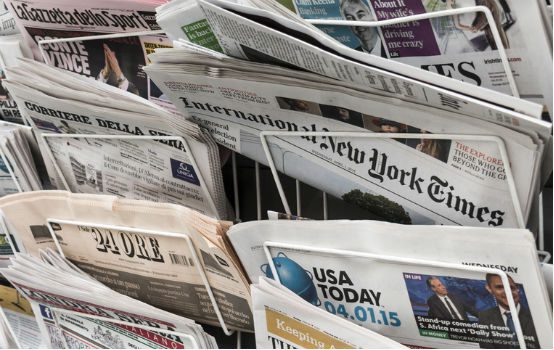Don’t Cheer the Decline of the Newspaper Industry

According to a Pew Research Center report released in late July, employment in newsrooms throughout the United States fell by 23 percent between 2008 and 2017. And the largest loss was recorded in the newspaper industry. The Pew report, which analyzed data from the United States Bureau of Labor Statistics, shows that newspaper jobs are not simply shifting to Internet outlets, as many might assume. Digital-only newsroom employment did rise in the period studied, but not nearly enough to cover the job losses at newspapers.
According to the Pew report, in 2008 there were 114,000 people employed in American newsrooms (this number includes the newsrooms of newspapers, radio, broadcast television, cable television, and digital news). That number dropped to 88,000 in 2017, for a total loss of about 27,000 employees in newsrooms. Newspapers took the largest hit, with newsroom employment dropping by a whopping 45 percent over the period, from 71,000 employees in 2008 to 39,000 in 2017, for a total loss of 32,000 jobs. Digital news, meanwhile, which many wrongly assume to be replacing newspaper jobs, saw its newsroom employment increase by only 6,000 jobs.
How bad has it gotten? In late August, the Post-Gazette of Pittsburgh announced that they would be cutting their print edition to five days per week, making that city the largest in the United States without a daily print newspaper. The CEO of the newspaper’s publisher says it will be focusing instead on digital content. Also in August, McClatchy, which publishes local newspapers throughout the country, announced that they would be cutting almost 140 staff positions. In a letter to employees, McClatchy’s president and CEO wrote that although the company’s digital revenue was increasing, the gains were not offsetting the losses in print advertising revenue. That same problem has popped up at newspapers across the country.
These woes are real and no one should be celebrating them. A loss of good local newspaper journalism hurts communities that rely on small papers to tell their stories.
Consider the elections of 2018. While the national media caters to their nationwide audience, with most of its coverage dedicated to the midterm congressional elections and the balance of power in Washington, there are thousands upon thousands of other elections taking place. This year, 36 states are holding gubernatorial elections, and 82 percent of all state legislative seats out of a total of 7,383 are being contested. Also this year, 49 of the nation’s 100 largest cities are holding municipal elections.
To make informed decisions in these elections, the voters need journalists who can inform them about political candidates and local issues. These should draw as much attention from local journalists as national reporters pay to every word and movement coming from, or concerning, President Donald Trump.
Those who celebrate the newspaper industry’s struggles because, as they argue, a biased mainstream media needs to be destroyed are misguided. A slanted press is a real problem and likely a significant contributor to the erosion of trust in the media. The proper way to confront this bias, however, is not to hope for wholesale destruction, but rather either to aid in the repair of what has been broken or support competition for those outlets that are irreparable and irredeemable.
When one vents about how wonderful it is that an “elite” and “leftist” media are financially unhealthy, one is not considering that the journalism jobs being lost are not being replaced. The fall of a perceived elitist mainstream newspaper does not mean that some scrappy non-biased paper has miraculously sprung up in its place.
In a fractured media marketplace, it has been difficult for many news outlets to gain sustainable traction. Those who claim to understand the importance of good journalism should lend support to outlets that attempt to provide that good journalism, instead of sitting idly by and celebrating the struggles of media they do not like.
Good journalists strive to tell stories and good journalism seeks to inform. When those elements come together, the people benefit and are brought closer to the truth. The local newspaper reporter is constantly out in his community, seeking to dig up new information and bring it to those who live there. No one who believes, along with Aristotle, that “all men by nature desire to know” should endorse this continued hemorrhaging of newspaper jobs.
One of the most important things that needs to happen is for newspapers to be decentralized. Each layer—national, city, and community—has its duty. Unfortunately, the continued struggles in the newspaper industry, the fragmentation of the digital news industry, and an inability of many new digital outlets to gain financial traction have meant that more and more only the largest outlets can survive. Thus readers are increasingly left with news that is, of course, focused on national issues. With regard to digital news, the vast majority of successful new ventures are those that cater to a national audience.
Another problem is that many readers are turning to news outlets that mirror their likes and interests, as well as their ideologies. Those who have grown weary with a biased mainstream media, instead of switching to something more objective, have instead started consuming news that is ideologically aligned with their own beliefs.
The result of all this is an increasingly large hole in journalism, and especially local journalism.
If one wants to tear down the necessary, one must make sure that the necessary will be rebuilt. In the case of newspapers, there is no adequate rebuilding as of right now. Instead of cheering for the media’s decline, the focus should be on repairing and renovating what is already in place, to ensure that communities are informed and people are brought closer to the truth.
Gerard T. Mundy is a writer and teaches philosophy, as a political philosophy/political theory specialist, at a private college in New York.
Comments